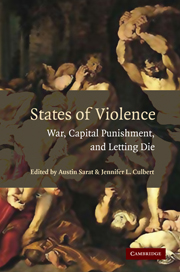Book contents
- Frontmatter
- Contents
- Contributors
- Acknowledgments
- 1 Introduction: Interpreting the Violent State
- PART I ON THE FORMS OF STATE KILLING
- PART II INVESTIGATING THE DISCOURSES OF DEATH
- 9 Death in the First Person
- 10 Open Secrets, or The Postscript of Capital Punishment
- 11 Ethical Exception: Capital Punishment in the Figure of Sovereignty
- 12 No Mercy
- Index
- References
12 - No Mercy
Published online by Cambridge University Press: 11 September 2009
- Frontmatter
- Contents
- Contributors
- Acknowledgments
- 1 Introduction: Interpreting the Violent State
- PART I ON THE FORMS OF STATE KILLING
- PART II INVESTIGATING THE DISCOURSES OF DEATH
- 9 Death in the First Person
- 10 Open Secrets, or The Postscript of Capital Punishment
- 11 Ethical Exception: Capital Punishment in the Figure of Sovereignty
- 12 No Mercy
- Index
- References
Summary
In the book that Gilles Deleuze called a “new philosophy of law,” François Ewald suggests that the primary task for the philosophy of law is to inquire critically into the conditions under which various societies reflect on, throw into question, and strip self-evidence from – in short, problematize – their own juridical experience. Capital punishment is a particularly interesting matter for the philosophy of law that is so construed. The question, as Norberto Bobbio formulates it, of “whether it is morally and/or juridically permissible for the state to kill in order to punish” was not raised by any of the religions of the book, by classical political philosophy, or by the modern political philosophies that otherwise broke so decisively with both religious tradition and classical political philosophy. Only when thought within the horizon of eighteenth-century political economy, where its wasteful ineffectiveness could suddenly be raised as a problem for the government of the emergent modern state, does it seem that the abolition of the death penalty became intelligible as a distinct juridical possibility.
The conditions for this problematization, however, are at best poorly understood. Thanks in large part to Michel Foucault's Discipline and Punish, there is today a theoretical consensus that Cesare Beccaria's 1764 criticism of the death penalty, On Crimes and Punishments, focused less on its cruelty or inhumanity than on its simple uselessness for the well-being and security of the public (salute pubblica).
- Type
- Chapter
- Information
- States of ViolenceWar, Capital Punishment, and Letting Die, pp. 297 - 308Publisher: Cambridge University PressPrint publication year: 2009



